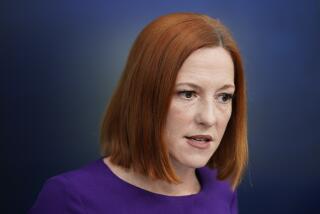Public Awareness : PBS Struts Its Stuff To Nab Viewers For The Fall Season
- Share via
No longer content to passively watch its viewers tune out and watch cable, PBS has decided to get tough and aggressively counterprogram.
Last week, as the networks were airing season premieres of new and returning series, PBS devoted its prime-time schedule to one show: Ken Burns’ 11-hour documentary “The Civil War.” And on Sunday, PBS officially begins its new fall season with a potpourri of series and specials entitled “Showcase Week.”
“It’s a celebration,” said Jennifer Lawson, executive vice president for programming and promotional services. “It’s not so much a sampling of all you can see on PBS, but a sampling of some of the best we traditionally have.”
Lawson said PBS doesn’t have the viewership it would like: “Like the networks, we have been affected by the drop in viewership overall and the increased competitive nature of what viewers have available (to watch). Our numbers have dropped slightly. All of our activities are designed in part to help reverse that trend and more importantly, it is just a part of our new approach in trying to make people aware of public TV.”
To heighten the awareness of “Showcase Week,” PBS is even airing commercials on its competition.
Beginning the week is the season premiere of “Nature” and the season opener of “Masterpiece Theatre.” See related story for a complete schedule of “Showcase Week.”
Paul Winfield, a familiar face on PBS (“American Playhouse” and “Wonderworks”), hosts “Showcase Week.” “We wanted a host who was not just simply a celebrity who did not have a connection to public TV,” Lawson said. “It was important to have somebody whose work reflected what PBS was about.”
While cable’s A&E; Network and Discovery Channel still acquire a majority of their programs from Britain, Australia and Canada, PBS has decreased its number of imports. “We have made a conscious effort over the past 10 years to put far more of our resources into our own productions,” Lawson said. “That was our intent behind the creation of “American Playhouse,” “Wonderworks,” “American Masters,” and “The American Experience.” At one point, someone said we may have too many series that are entitled “American something,” she said, laughing.
PBS is in the midst of restructuring, “so we have a bit more centralization of our funding and can then support new programming,” she said.
Until now, PBS stations across the country would individually purchase the programs that made up the PBS schedule. “That put PBS in a passive position of just scheduling what the stations collectively decided to buy,” said Lawson. That explains why each local station can air PBS programs on different days, at different times or not at all.
PBS hopes to achieve uniform scheduling sometime next year.
The network is banking that in some cases viewers would rather watch a special multipart series such as “The Civil War” over an entire week instead of airing one episode a week over several months. When a series is extended over a period of time, viewership tends to drop.
“If you want to see the next episode, you have to make an appointment to see it the next Wednesday and the Wednesday after that,” Lawson said. “Putting the series on during a week, there is a greater likelihood viewers who find it compelling material will come back to it.”
More to Read
The complete guide to home viewing
Get Screen Gab for everything about the TV shows and streaming movies everyone’s talking about.
You may occasionally receive promotional content from the Los Angeles Times.







